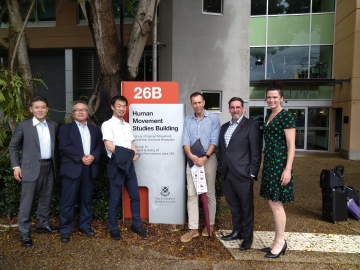(1)
■Date & Time
Wednesday, January 17, 2018/ 18:15~19:45
■Venue
Room 960, Bldg.#14, Waseda Campus
■Title
“Machiavelli and Republicanism”
(2)
■Date & Time
Thursday, January 18, 2018/ 18:15~19:45
■Venue
Room 960, Bldg.#14, Waseda Campus
■Title
“New Republicanism”
(3)
■Date & Time
Friday, January 19, 2018/ 18:15~19:45
■Venue
Room 960, Bldg.#14, Waseda Campus
■Title
“Republican Patriotism”
■Lecturer
Prof. Jun-Hyeok KWAK (Sun Yat-sen University)
■Abstract
These lectures aim at providing students with an opportunity to see about one of the most currently important topics in the field of political theory: the Revival of Republicanism. That I refer to is a version of neo‐Roman republicanism, which has been developed by Quentin Skinner since 1980s and sophisticated by Philip Pettit. Like other republicans, they represent a set of normative ideas, such as community, civic virtue, civility, commonly shared knowledge, self‐government and participation with others in politics. However, their argument is not that one of these normative ideas is intrinsic to liberty or given by nature, but rather that a political ideal that is at once anti‐collectivist and anti‐atomist can be obtained without going back to the notion of Aristotle’s zoion politikon or without making the cultivation of widespread civic virtue the highest end of political life. In addition, they argue that active participation in politics and widespread civility must be valued and required, not necessarily because they are good in themselves, but because they ultimately contribute to the realization of liberty as non-domination. At this juncture, non-domination does not refer to ‘no-rule.’
Interestingly enough, these neo‐Roman republican ideas in Northeast Asian countries continue to face serious conceptual and political challenges, which scholarly literature on both republicanism and on East Asian politics has largely failed to confront. On the one hand, the conception of non-domination should contest all different ideas of political authority which traditionally associate the substance of political power with domination and subjugation. On the other hand, the reconfiguration of the term ‘republic,’ inspired as it was by the introduction of neo-Roman republican ideas in Northeast Asian countries, has been focused on harmony or integration between compatriots in a political community. Third, in Northeast Asian countries neo-Roman republicanism has not been recognized as a concept qualitatively different from civic or communitarian republicanism.
Based on these considerations, my lectures firstly address these challenges by surveying the basic classical readings which are relevant to the latest interpretations of how the new version of republicanism can reconcile civic commonality with individual autonomy.
In the first lecture(entitled “Machiavelli and Republicanism” on 17thJanuary), we are going to examine Machiavelli’s republicanism where liberty as non-domination was conceptualized as a way to overcome the classical version of republicanism chiefly driven by the Ciceronian conception of the aristocratic mixed regime.
Then, in the second lecture (entitled “New Republicanism” on 18thJanuary), we will investigate the essential characteristics of new republicanism and their theoretical and practical implications. More specifically, elaborating the philosophical backgrounds in which the new republicanism postulates a conception of liberty as non-domination, this lecture shed lights on liberty as non-domination as an anti-atomic as well as anti-collective compass.
Finally, in the third lecture (entitled “Republican Patriotism” on 19thJanuary), we will address the theories of republican patriotism, especially articulated by Maurizio Viroli, that promote republican patriotism as the archetype of patriotism without nationalism. The upshot of this lecture is that we need a regulative principle with which we can guard our patriotic loyalty from degenerating into collective selfishness.
■Language
English
■Audience
Students, faculty, staff and general public
■Admission
Free








